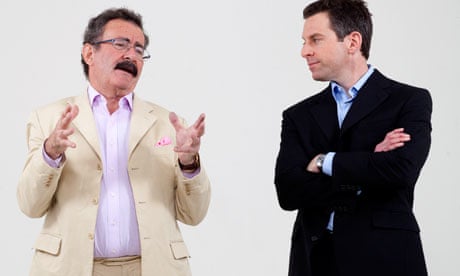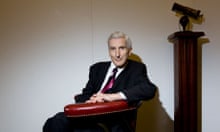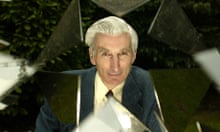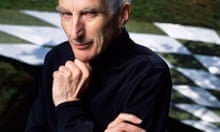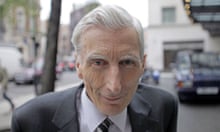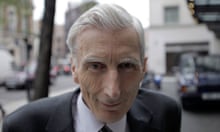Last week, the astrophysicist Martin Rees was awarded the Templeton prize, which aims to promote religion. Emine Saner brings together atheist writer and neuroscientist Sam Harris and Professor Robert Winston to discuss the conflict between science and faith. So, should Rees have accepted that award?
Sam Harris: No. There is a price paid whenever an eminent scientist pretends that there's no conflict between the claims of science and religion. I mean no special criticism of Rees – I think he's someone who believes, perhaps as you do, that it is pragmatic to try to teach science wherever people are willing to listen, and not criticise faith and try to allay the points of conflict as much as possible. That's a political position which I think is in the end unsustainable.
Robert Winston: I see nothing wrong with a scientist accepting the Templeton prize, with somebody trying to promote what they loosely call "spirituality". Whether it does any good is another matter. I don't think it takes away at all from his distinction in science.
SH: Religious language is, without question, unscientific in its claims for what is true. We have Christians believing in the holy ghost, the resurrection of Jesus and his possible return – these are claims about biology and physics which, from a scientific point of view in the 21st century, should be unsustainable.
RW: You talk as if science is an absolute, and I don't think it is at all. It isn't the truth either, because I don't believe there is such a thing as "the truth". You rail against the ultimate truth of what some people believe – ie religion, God, Jesus, whatever. I don't, because I don't think it makes any more sense than railing against scientific truths. I say "truths" in inverted commas, because truths have a habit of being altered as we develop our knowledge.
SH: I wouldn't dispute that the horizon of what we know and consider true changes, but we do this in the context of a background reality which we are dimly coming to understand. I suspect that while you are reluctant to think we can ever grasp absolute truth, we can still recognise falsehood, or how implausible certain [religious] claims are.
RW: I suppose I really wonder why you're so angry.
SH: [laughs] Do I sound angry?
RW: Yes. You write angrily, too.
SH: I'm more worried than angry, and perhaps impatient. I don't see any reason to believe that we can survive our religious differences indefinitely. I am worried that religion is one of the forces that has balkanised our world – we have Christians against Muslims against Jews.
RW: But the irony is that books like yours and [Richard Dawkins's] God Delusion balkanise the world a good deal more, because they polarise views. The God Delusion has caused very aggressive reactions from [people who] previously weren't aggressive. In my book, I try to talk about our responsibility as scientists, one of which is to indulge in dialogue with people who are not scientists. One of the ways [atheist science writers] make dialogue is by being aggressive or angry with people who don't agree with your view.
SH: I'd like to pick up on this issue of responsibility. This is perhaps a greater problem in the US, but in principle it's a problem everywhere. Take someone like [geneticist] Francis Collins who, as one of the most influential scientists in the US will, in a lecture, put up slides which say "13.7bn years ago almighty God created the heavens and the earth", and talk about how God implanted free will, like some kind of software upgrade, into the brains of primates, because free will and moral law are impossible to envision as products of evolution.
RW: Supposing he is right?
SH: But there is no good scientific reason to think he's right.
RW: You quote Collins in your book: "as I rounded a corner and saw a beautiful waterfall hundreds of feet high, I knew the search [for God] was over." You write, in commentary, "it is astounding that this passage was written with the intent of demonstrating the compatibility of faith and reason". But he is making his own personal judgement about his circumstances, not preaching to the world. Your writing is lovely, funny, but I don't think the denigration of a serious scientist like Collins does a lot of good. We should be very careful about criticising other scientists, except when their science is clearly at fault.
SH: What about when their reasoning is at fault?
RW: I think his reasoning is not relevant to the sequencing of the human genome, which is what he's famous for. I'm certainly not going to stand up for [Collins's] view of Jesus or religion.
SH: But you believe he's entitled to believe it as a scientist?
RW: I think he's entitled to believe it as a human being. I think it's important for scientists to be a bit less arrogant, a bit more humble, recognising we are capable of making mistakes and being fallacious – which is increasingly serious in a society where our work may have unpredictable consequences.
SH: I agree with all that. I just think you have humility and arrogance reversed in this case. Humility is very much on the side of science and honest self-criticism. The arrogance is claiming to be certain about truth claims of Iron Age philosophy, which someone like Collins does.
RW: But do his views detract from the outstanding work he has done?
SH: They do detract from his responsible education of people on science.
RW: That's not what I said. Do they detract from the work?
SH: You're suggesting that a scientist can practice his science in isolation from the rest of the scientific worldview. In the States you find biochemists who are young-earth creationists, who think that Genesis is a literal story of cosmology.
RW: I think they're entitled to their view. I think they're wrong, but so what?
SH: You wouldn't say that a doctor is entitled to believe his patients were sick from the evil eye, or voodoo. You wouldn't say Francis Collins is free to deny the germ theory of disease. You're recommending he practises his science in a walled garden. That's an intellectual problem. Every scientist has to admit what is offered as true in the context of religion is scientifically unjustified.
RW: Ever since I first debated this, going back 10 or 15 years, with my friend Richard Dawkins, I don't think it has produced any real enlightenment. It reinforces the prejudices on both sides. I can't argue with the title of your book, it's very neutral. Much as I like and admire Richard Dawkins, I do think that to call a book the God Delusion is very worrying because the title implies that if you don't believe in what I believe then you are "deluded". That, I think, is a dangerous concept and one that is unlikely to win hearts and minds.
The Moral Landscape by Sam Harris is published by Bantam Press at £20. Bad Ideas? by Robert Winston is published by Bantam Books at £9.99.
